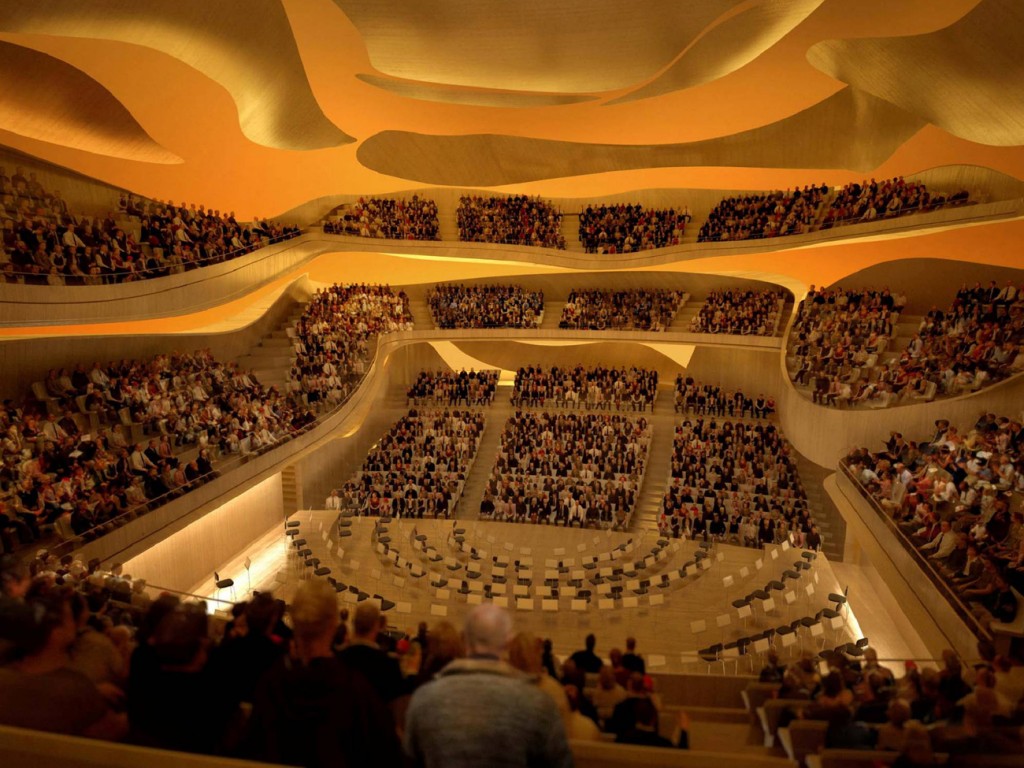Designer Jean Nouvel claims the new 2,400 venue is unfinished and acoustically untested.
The new Philharmonie de Paris concert hall, situated in the Parc de la Villette area in the north of the French capital welcomed its first audience last night under a cloud of controversy after it emerged that the building’s architect, Jean Nouvel would boycott the opening of the new venue.
In a statement, published in French newspaper Le Monde, Nouvel claimed that the concert hall was “not finished”, as well as making accusations of structural compromises and cut-corners during the construction process which were made against his advice. Nouvel also revealed that the hall had not undergone any acoustic testing, and that pressure to complete the venue “did not allow the architectural and technical requirements to be respected. This despite all the warnings which I have been giving since 2013.”
Nouvel’s striking vision for the 2,400 seat venue, which features a sloping metal roof which patrons can walk across, was selected as part of a design competition in 2007. A string of scheduling, construction and budget issues have dogged the Philharmonie de Paris project for several years. The hall was officially opened by French president Francois Hollande at yesterday evening’s performance, three years after its originally scheduled completion date. In addition to the delayed opening, building costs, which were entirely government funded, spiraled out of control resulting in a final bill of €387 million, €187 million more than the original cost estimate of €200 million.
 A rendering of Philharmonie de Paris’ auditorium
A rendering of Philharmonie de Paris’ auditorium
In his statement Nouvel distanced himself from the financial and scheduling failures of the Philharmonie de Paris, which have been the subject of major criticism in the French press. “Numerous articles published recently in the press and reports broadcast on television establish a direct link between cost overruns in the budget of the Philharmonie de Paris and alleged modifications of the project that are attributed to me,” Nouvel states. “These charges are unfounded… I will not tolerate that untruthful, defamatory and disparaging writings or comments are made about me.”
The inaugural performance, given by the Orchestre de Paris and its choir, featured Ravel’s Daphnis and Chloe suite No 2, three movements from Faure’s Requiem, and Stravinsky’s masterpiece The Rite of Spring. Marshall Marcus, former Head of Music at London’s Southbank Centre (a hall which has undergone significant modifications to improve its acoustics in recent years), published an appraisal of the hall on his blog confirming Nouvel’s concerns about the “unfinished” state of the hall and the lack of attention paid to acoustic quality. However his review of the opening performance does offer some optimism for the Philharmonie’s future. “When it’s actually ready (months off from what I could see, I was really astounded by the lack of finish throughout), if they can stop the stalls seats from wobbling, if they can get rid of the excruciating background hum that I could hear in every silence, when it’s staffed by ushers who all know the answers to our questions, then this will be one of Europe’s best halls,” Marcus states.
The ordeal of Jean Nouvel bears an uncanny similarity to issues encountered by the architect of the Sydney Opera House, Jørn Utzon. Utzon resigned during the construction of the venue due to enforced changes to his designs, and in particular the interiors of the iconic building, by the government of NSW Premiere Robert Askin. When the venue was finally opened by HRH Elizabeth II in 1973, Utzon was not invited to the ceremony, or even mentioned in the speeches. It wasn’t until 2004 and the dedication of the Opera House’s Utzon Room that his remarkable contribution to the world of architecture and Australian culture was formally recognised.











Comments
Log in to join the conversation.